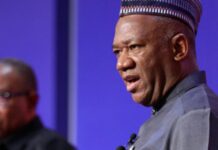The University of California San Francisco (UCSF) Medical Center is renowned for its exceptional patient care, recently receiving the highest award for patient satisfaction. Behind this recognition lies a comprehensive healthcare approach that prioritizes both physical and emotional well-being. A key figure contributing to this achievement is Fr. Dzungwenen Raymond Tyohemba, a Nigerian-born Catholic priest, board-certified chaplain, and healthcare ethics consultant whose work at UCSF integrates spiritual care with medical treatment.
We sat down with Rev. Tyohemba to learn more about his role and how his chaplaincy has been pivotal in ensuring patients receive compassionate, holistic care.
(Q): Father Raymond Tyohemba, it’s great to have you here today! Your journey from Nigeria to becoming a Board–Certified Chaplain at one of America’s leading pediatric hospitals is genuinely inspiring. Can you share how you arrived at this specialized role?
Father Tyohemba (A): “Thank you for the warm welcome! My journey has been truly unique. I was born and raised in Nigeria, where I was ordained as a priest in the Via Christi Society. My passion for providing spiritual care deepened during my time as a parish priest, where I witnessed the profound impact of emotional support on the sick. This led me to pursue Clinical Pastoral Education (CPE) while completing my graduate studies at the University of San Francisco. Today, I’m honored to serve as the Lead Catholic Priest Chaplain at the University of California San Francisco Benioff Children’s Hospital, a facility consistently ranked among the top pediatric hospitals in the United States, where I have worked with over 200 critically ill children and their families.”
(Q): Your journey is truly remarkable, Father Tyohemba. Could you elaborate on what Clinical Pastoral Education (CPE) entails and how it has influenced your work as a chaplain?
Father Tyohemba (A): “CPE is more than just a training program; it’s a transformative journey that equips aspiring chaplains with the skillset they need to provide effective spiritual care. Structured as an adult, graduate-level experience, CPE immerses participants in clinical settings where they engage in hands-on ministry and reflective learning. This cycle of action-reflection-action allowed me to hone my skills in trauma-informed care, pediatric counseling, and end-of-life support, ultimately enhancing the emotional well-being of patients and families during their most challenging times.”
(Q): But what does a chaplain do?
Father Tyohemba (A): “A chaplain serves as a trained spiritual care specialist within the healthcare team, offering psychospiritual support to patients, families, caregivers, and staff. We help individuals draw on their spiritual, religious, emotional, and cultural resources, empowering them to cope with the challenges of hospitalization. At UCSF, our approach emphasizes a holistic view of healing—addressing mind, body, and spirit—ensuring that patients receive comprehensive care tailored to their unique needs. Through this, I have contributed to numerous positive patient outcomes, including a significant decrease in anxiety reported by families receiving chaplaincy services.”
Q: What inspired you to focus specifically on pediatric chaplaincy?
Father Tyohemba (A): “Imagine a world where superheroes wear hospital gowns instead of capes. This is the world of pediatric chaplaincy, where courage often comes in small packages, and hope shines brightest in the darkest times. I was drawn to this field because children embody resilience; they face daunting diagnoses with a spirit that can inspire even the strongest adults. My role goes beyond supporting children; it extends to helping families navigate these challenging times, ensuring they have the emotional and spiritual resources to cope. Each interaction reminds me of the profound impact of faith and compassion in the healing process.”
(Q): Father Tyohemba, you’ve touched on the resilience of children and the importance of supporting families through tough times. Can you share a particular moment or story that’s stayed with you—an experience where you felt the true impact of your work?
Father Tyohemba (A): “One moment that has profoundly impacted me occurred early in my tenure at UCSF Benioff Children’s Hospital. I met a little boy—I’ll call him Ben—who was bravely battling a terminal illness. His spirit illuminated the room, despite the surrounding challenges. One afternoon, while coloring, he turned to me and asked, ‘Father, what’s heaven like? Will I still get to play there?’ In that moment, I realized my role was not just to comfort Ben but to support his family, helping them find peace amidst unimaginable pain. Our conversation about his vision of heaven provided solace to his parents during those last days. Such experiences reinforce the critical role of listening and being present in the lives of families facing profound loss.”
Q: It must be incredibly challenging, especially in such sensitive situations. How do you maintain your own emotional and spiritual resilience in the face of such intense work?
Father Tyohemba (A): This ministry can be emotionally heavy, and it’s essential for chaplains and caregivers to prioritize self-care. I rely on my faith and prayer life, exercise, and sleep to recharge. Community support is also crucial; we cannot carry this weight alone. By maintaining clear boundaries and collaborating with the medical team, we ensure comprehensive care without overburdening ourselves. This collaborative approach enhances our resilience and strengthens the support we offer to patients and families.
Q: It’s clear that you play a crucial role in the healthcare setting. What has been your greatest challenge as a chaplain, and what has been your greatest reward?
Father Tyohemba (A): The greatest challenge is definitely walking with families through the loss of a child. No matter how many times you face it, it’s never easy. You feel the depth of the family’s pain, and while you’re there to provide support, you also feel a profound sense of loss. It’s a constant balancing act—being fully present for the family while maintaining the strength to continue the work.
In response to the challenges posed by the COVID-19 pandemic, we faced additional complexity. We recognized the growing need for pastoral care when families could not be physically present with their loved ones. To address this, we developed a tele-chaplaincy model that allowed our team at UCSF to provide spiritual guidance remotely. This innovation continues to be an essential element in terms of equitable provision of spiritual care.
The greatest reward, however, is knowing that you’ve made a difference in people’s lives; I was Jesus’ arms to embrace them. Families often express gratitude for the emotional and spiritual care they’ve received, even in the most heartbreaking moments. Knowing that I’ve been able to bring some level of peace, comfort, or meaning to families during their darkest hours is what keeps me going.
Q: What do you hope to achieve in the future, especially considering that chaplaincy, as you practice it, is still a relatively unknown concept in places like Nigeria?
Father Tyohemba (A): In addition to my work at UCSF, I am spearheading efforts to bring formal chaplaincy services to Nigeria, where spiritual care is greatly underdeveloped. I have already initiated conversations with leading healthcare institutions to develop clinical pastoral education programs tailored to Nigeria’s unique cultural and healthcare needs. This work is part of my larger vision to make spiritual care a global healthcare standard, impacting developed and developing countries.
Q: Thank you for sharing your incredible journey and the vital work you do, Rev. Tyohemba. Is there a final message you’d like to leave with our readers?
Father Tyohemba (A): My final message would be to encourage people to think about healthcare not just as treating the body, but as caring for the whole person—body, mind, and spirit. Whether you’re in Nigeria or anywhere else, we all need support when we face life’s biggest challenges. Chaplaincy provides that support, and I hope that more people will come to see its value. Thank you for allowing me to share my story.





